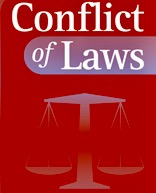Cresswell v Cresswell Estate 2017 BCSC 178 dealt with a conflict of law situation and held that the jurisdiction of the BC court should be denied for a wills variation action and held that it should properly be filed under Alberta court jurisdiction as the deceased was found to be “ordinarily resident ” there.
The plaintiff was the surviving spouse who after marrying the deceased in Alberta in 1994 lived together there until buying a house in BC in 2014 that was registered in joint tenancy and which went to the surviving plaintiff after her death.
The deceased returned to Alberta in 2015 for cancer treatments and to live with family and remained there until her death in late 2016.
Her will provided that it would be interpreted as per the laws of Alberta.
Her will left everything to her three children who were all Alberta residents.
The court interpreted the Court Jurisdiction and Proceedings Transfer act and held that the deceased had a settled intention to ordinarily reside in Alberta when she moved there in November 2015, and that at the time of her death she had no real or substantial connection to BC.
The Court determined that Alberta was the proper jurisdiction for the case having regard to the interests of the parties and the ends justice, and declined to exercise BC jurisdiction in favour of Alberta.
Section 10(b) of the Court Jurisdiction and Proceedings Transfer Act, S.B.C. 2003 c. 28 states as follows:
10 Without limiting the right of the plaintiff to prove other circumstances that constitute a real and substantial connection between British Columbia and the facts on which a proceeding is based, a real and substantial connection between British Columbia and those facts is presumed to exist if the proceeding
…
(b) concerns the administration of the estate of a deceased person in relation to
(i) immovable property in British Columbia of the deceased person, or
(ii) movable property anywhere of the deceased person if at the time of death he or she was ordinarily resident in British Columbia
Section 11(1) states:
11 (1) After considering the interests of the parties to a proceeding and the ends of justice, a court may decline to exercise its territorial competence in the proceeding on the ground that a court of another state is a more appropriate forum in which to hear the proceeding.
(2) A court, in deciding the question of whether it or a court outside British Columbia is the more appropriate forum in which to hear a proceeding, must consider the circumstances relevant to the proceeding, including
(a) the comparative convenience and expense for the parties to the proceeding and for their witnesses, in litigating in the court or in any alternative forum,
(b) the law to be applied to issues in the proceeding,
(c) the desirability of avoiding multiplicity of legal proceedings,
(d) the desirability of avoiding conflicting decisions in different courts,
(e) the enforcement of an eventual judgment, and
(f) the fair and efficient working of the Canadian legal system as a whole.
The term “ordinarily resident” has been interpreted by the Court in Blazek v. Blazek, 2009 BCSC 1693, at paras. 31-35:
[31] Section 3 of the Act provides that the court has territorial competence in a proceeding if the person is “ordinarily resident in British Columbia at the time of the commencement of the proceedings.” Although the evidence is somewhat conflicting, it appears that at the time this action was commenced in 2007, the defendant split his time between the Czech Republic and Kelowna, British Columbia. There is a dispute between the parties regarding whether the amount of time the defendant spent in British Columbia was more or less than 150 days.
[32] The meaning of “ordinarily resident” has been considered by the courts on many occasions. The authority often referred to is Thomson v. Minister of National Revenue, [1946] S.C.R. 209, [1946] C.T.C. 51, where Mr. Justice Estey stated:
A reference to the dictionary and judicial comments upon the meaning of these terms indicates that one is “ordinarily resident” in the place where in the settled routine of his life he regularly, normally or customarily lives. One “sojourns” at a place where he unusually, casually or intermittently visits or stays. In the former the element of permanence; in the latter that of the temporary predominates. The difference cannot be stated in precise and definite terms, but each case must be determined after all of the relevant factors are taken into consideration, but the foregoing indicates in a general way the essential difference. It is not the length of the visit or stay that determines the question. …
…
It is well established that a person may have more than one residence…
[33] I am satisfied that the defendant resided in both places in 2007. I agree with the plaintiff’s position that “ordinarily resident” should be given a broad and liberal interpretation, in accordance with the provisions of the Act regarding corporations ordinarily resident in the province; “ordinarily resident” does not require a counting of days in which a party may spend in this jurisdiction. One can be ordinarily resident in more than one jurisdiction.
[34] I am satisfied that the defendant was ordinarily resident in British Columbia. He was served with the writ of summons and statement of claim in this action at the Kelowna address and he was a director and officer of a company which listed the Kelowna address as the defendant’s address at the time the action was commenced. Further, the defendant files his income tax in Canada and receives a pension in Canada.
[35] On this test, the court has territorial competence to hear the matter.
[27] I am satisfied that the deceased had a settled intention to ordinarily reside in Alberta when she moved there on November 14, 2015 and took up residence at her sister’s home. It is clear from the evidence that she intended to remain in Alberta to be around her family and although some of her comments that were transcribed by the plaintiff are inconsistent where she said, on November 19, 2015: “[t]hat’s sad hopefully I will be back there in a few months”, referring to Westbank, and on January 14, 2016: “One last thing I love you please remember that”. Those comments must be taken in context to her impending death. It is clear that she was applying for Alberta medical coverage, she changed her mailing address on her Edmonton Royal Bank chequing account to that of her sister, she had a will drawn up in Edmonton to be governed by the laws in Alberta, and it is clear from the telephone messages that she wished to sell the home in Westbank. Her contacting a lawyer and attempting to commence divorce proceedings shows her intention to separate from the plaintiff as was the January 9, 2016 text: “You said you were here for me and you are a liar. I want you out.”
[28] I am satisfied, based on all the evidence, that at the time of her death, the deceased was ordinarily resident in Alberta.
[29] I am also satisfied that at the time of her death she did not have any real and substantial connections to British Columbia (s. 10 of the Court Jurisdiction and Proceedings Transfer Act).
[30] The defendants also say that this court should decline to exercise its territorial competence in accordance with s. 11 of the Court Jurisdiction and Proceedings Transfer Act.
[31] Section 11(1) states:
11 (1) After considering the interests of the parties to a proceeding and the ends of justice, a court may decline to exercise its territorial competence in the proceeding on the ground that a court of another state is a more appropriate forum in which to hear the proceeding.
(2) A court, in deciding the question of whether it or a court outside British Columbia is the more appropriate forum in which to hear a proceeding, must consider the circumstances relevant to the proceeding, including
(a) the comparative convenience and expense for the parties to the proceeding and for their witnesses, in litigating in the court or in any alternative forum,
(b) the law to be applied to issues in the proceeding,
(c) the desirability of avoiding multiplicity of legal proceedings,
(d) the desirability of avoiding conflicting decisions in different courts,
(e) the enforcement of an eventual judgment, and
(f) the fair and efficient working of the Canadian legal system as a whole.
[32] Here, I am satisfied that the evidence is overwhelming, that all of the defendants and all the evidence concerning the execution of the will, and deceased’s assets, are in Alberta, as are the witnesses. I am satisfied after considering the interests of the parties to this proceeding and the ends of justice that this court should decline to exercise its territorial competence as Alberta is the more appropriate forum in which to hear these proceedings.










